Workday's AI Job Screening Tool Faces Expanded Discrimination Lawsuit
3 Sources
3 Sources
[1]
Discrimination Lawsuit Against Workday's Job Screening AI Gets Bigger
This week, Judge Rita Lin ruled in San Francisco Federal Court that a 2023 case filed by a single plaintiff claiming Workday's tech caused over 100 of his job applications to be rejected due to his age, race and disabilities may now be transformed into collective action litigation. Like a class action suit, those cases can be joined by other people claiming to have been similarly wronged by the same company. In this instance, that involves four individuals who -- like the initial petitioner -- argue the Workday algorithm almost immediately rejected their candidacies for vacancies because they were 40 years old or older. Worse still for Workday, Lin said the expanded case could also be joined by even more "similarly situated individuals of the lawsuit and provide them an opportunity to opt in to having their claims heard on a collective basis." The reason, Lin ruled, was to allow anyone "allegedly required to compete on unequal footing due to Workday's discriminatory AI recommendations" to be heard by the same court at the same time. Workday rejects the claims as unfounded. It also refutes the central allegation that its app actively filters out applications from people based on professional or personal characteristics designated as unwanted. The Pleasanton, Calif.-based firm says its tech isn't configured to weed out, much less discriminate against applicants. Instead, it says its automated AI evaluates applications based on client criteria for jobs available, and either retains or rejects candidates based on their merits. That initial phase of finding the best matches to specific positions saves hiring managers countless hours they'd have otherwise spent vetting CVs, Workday says.
[2]
Is the AI screening your resume biased? A lawsuit makes the case
Pages about historic figures were taken down from the Pentagon's website amid a push to purge DEI. Officials say artificial intelligence is to blame. A lawsuit against Workday alleges the company's screening technology discriminates against job applicants on the basis of race, age and disability in a case that raises new legal issues about how employers use artificial intelligence in hiring decisions. Derek Mobley brought the discrimination lawsuit against the human resources software company in 2023, alleging he applied for hundreds of positions over seven years only to be repeatedly rejected. Four other plaintiffs over the age of 40 have since joined the suit, blaming the AI recommendation technology that screens and ranks job applicants for "disproportionately" preventing older workers from "securing gainful employment." California federal judge Rita Lin ruled Friday the case can proceed as a collective action - similar to a class action - so Mobley can notify "similarly situated individuals of the lawsuit and provide them an opportunity to opt in to having their claims heard on a collective basis." "We continue to believe this case is without merit," Workday said in a statement. "This is a preliminary, procedural ruling at an early stage of this case that relies on allegations, not evidence. The court has not made any substantive findings against Workday and has not ruled this case can go forward as a class action. We're confident that once Workday is permitted to defend itself with the facts, the plaintiff's claims will be dismissed." The Workday lawsuit raises new issues about the use of AI and shows the possible legal exposure for AI vendors and for employers that increasingly relying on it. Human resources professionals lean heavily on AI technology to screen and rank applications and resumes. While the technology saves manpower and time, civil rights experts say the technology may have hidden biases that discriminate against job applicants based on protected characteristics such as gender and race. "AI tools are trained with a large amount of data and make predictions about future outcomes based on correlations and patterns in that data - many tools that employers are using are trained on data about the employer's own workforce and prior hiring processes. But that data is itself reflective of existing institutional and systemic biases," warned the American Civil Liberties Union. In 2014, a team of engineers at Amazon began building an algorithm to review resumes and determine which applicants the tech giant should hire. The system was scrapped a year later because it discriminated against women applying for technical jobs. Mobley said he received automated rejections again and again despite a finance degree from Morehouse College and experience since 2010 working in various financial, IT help desk and customer-service positions, sometimes in less than an hour. These systems are not "race neutral, disability neutral or age neutral," Mobley said in his complaint. Another plaintiff, Jill Hughes, said she also received automated rejections for hundreds of roles, often within a few hours of applying.
[3]
Federal Court Allows Collective Action Lawsuit Over Alleged AI Hiring Bias
, a man over 40 years old, sued claiming that Workday's artificial intelligence (AI)-driven applicant screening tools have systematically disadvantaged him and other older job seekers. Mobley submitted more than 100 applications to companies using Workday's platform, and he was rejected every time. Mobley alleged that the AI tools - designed to score, sort, rank or screen applicants - unfairly penalize older candidates. The court initially dismissed Mobley's complaint but granted permission to file an amended version. Subsequently, Workday attempted to have this amended complaint dismissed as well but was unsuccessful. The court, by denying Workday's motion to dismiss, recognized Mobley's claim as plausible under the Age Discrimination in Employment Act (ADEA), based on a disparate impact theory. This development marks a pivotal moment in the ongoing legal proceedings, as it allows Mobley to continue pursuing the case against Workday. Key Developments On , Judge of the granted preliminary certification under ADEA, allowing the lawsuit to move forward as a nationwide collective action - similar to a class action but requiring individuals to "opt in" to the lawsuit if they are interested in doing so. The case involves Mobley and four other plaintiffs representing all job applicants ages 40 and older who were denied employment recommendations through Workday's platform since . The court determined that the main issue - whether Workday's AI system disproportionately affects applicants over 40 - can be addressed collectively, despite the challenges in identifying all potential members of the collective action. In response, Workday has expressed that the lawsuit lacks merit and stresses that the court's decision is only preliminary. Implications for Employers This decision marks a pivotal moment in the evolving legal landscape surrounding AI. It stands as one of the most closely watched cases in the nation concerning the use of AI in employment decisions. This ruling underscores the growing scrutiny of AI in employment decisions and the potential for significant legal exposure. As discussed in a previous alert, employers must proactively assess algorithmic tools for potential bias and ensure compliance with evolving legal standards.
Share
Share
Copy Link
A federal judge has allowed a discrimination lawsuit against Workday's AI-powered job screening technology to proceed as a collective action, potentially opening the door for more plaintiffs to join the case alleging age, race, and disability bias.
Lawsuit Expansion and Collective Action Certification
A federal judge in San Francisco has ruled that a discrimination lawsuit against Workday's AI-powered job screening technology can proceed as a collective action. The case, initially filed in 2023 by Derek Mobley, alleges that Workday's AI tools discriminate against job applicants based on age, race, and disability
1
. Judge Rita Lin's decision allows the lawsuit to expand, potentially including more plaintiffs who claim to have been similarly affected by Workday's algorithm2
.
Source: Inc.
The collective action certification is similar to a class action but requires individuals to "opt in" to join the lawsuit. The case now represents all job applicants ages 40 and older who were denied employment recommendations through Workday's platform since a specified date
3
.Allegations and Plaintiff Claims
Mobley, the initial plaintiff, claims to have applied for over 100 positions using Workday's platform, facing rejection each time. He argues that the AI tools used for scoring, sorting, ranking, or screening applicants unfairly penalize older candidates
3
. Four additional plaintiffs over the age of 40 have since joined the suit, alleging that Workday's AI recommendation technology "disproportionately" prevents older workers from "securing gainful employment"2
.One plaintiff, Jill Hughes, reported receiving automated rejections for hundreds of roles, often within hours of applying. The lawsuit contends that these rapid rejections suggest a systemic bias in the AI-driven screening process
2
.Workday's Response and Defense

Source: USA Today
Workday strongly denies the allegations, stating that the case is without merit. The company argues that its technology is not configured to discriminate against applicants based on personal characteristics. Instead, Workday claims its AI evaluates applications based on client criteria for available jobs, retaining or rejecting candidates based on their qualifications
1
.The company emphasizes that the court's decision is preliminary and procedural, made at an early stage of the case based on allegations rather than evidence. Workday expressed confidence that once it can present its defense with facts, the plaintiff's claims will be dismissed
2
.Related Stories
Implications for AI in Hiring Practices
This lawsuit raises significant questions about the use of AI in employment decisions and highlights the potential legal exposure for both AI vendors and employers relying on such technologies. Human resources professionals increasingly use AI to streamline the application screening process, but civil rights experts warn that these technologies may harbor hidden biases
2
.The American Civil Liberties Union cautioned that AI tools trained on historical data might reflect existing institutional and systemic biases, potentially perpetuating discrimination in hiring practices
2
. This case is considered one of the most closely watched in the nation concerning AI use in employment decisions3
.Legal Context and Future Implications
The court recognized Mobley's claim as plausible under the Age Discrimination in Employment Act (ADEA), based on a disparate impact theory. This development allows the case to continue, focusing on whether Workday's AI system disproportionately affects applicants over 40
3
.As AI continues to play a significant role in hiring processes, this case underscores the growing scrutiny of such technologies and the need for employers to proactively assess algorithmic tools for potential bias. The outcome of this lawsuit could have far-reaching implications for the future use of AI in employment decisions and the legal standards governing such practices.
References
Summarized by
Navi
[3]
Related Stories
Job Seekers Sue Eightfold AI Over Secret Scoring System Used by Microsoft and PayPal
22 Jan 2026•Policy and Regulation

AI Hiring Tools Under Scrutiny: Uncovering Algorithmic Bias in Recruitment
15 Oct 2024•Technology

AI Resume Screening Tools Show Significant Racial and Gender Bias, Study Finds
01 Nov 2024•Technology

Recent Highlights
1
Google Gemini 3.1 Pro doubles reasoning score, beats rivals in key AI benchmarks
Technology

2
ByteDance's Seedance 2.0 AI video generator triggers copyright infringement battle with Hollywood
Policy and Regulation

3
ChatGPT cracks decades-old gluon amplitude puzzle, marking AI's first major theoretical physics win
Science and Research





